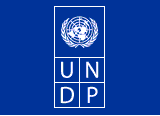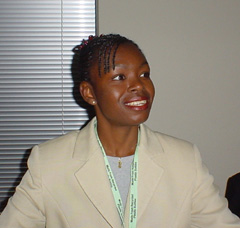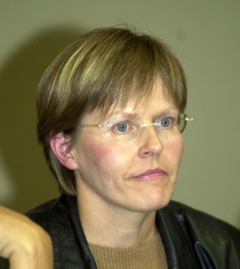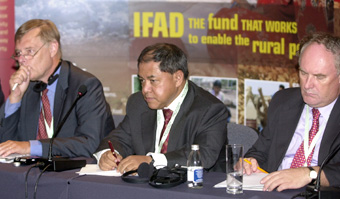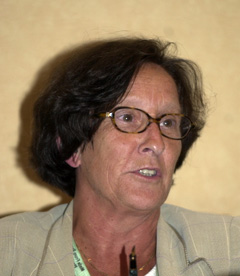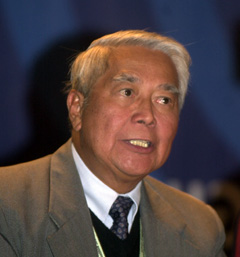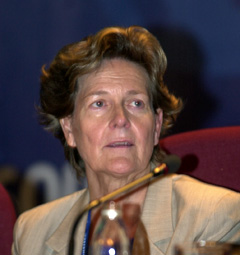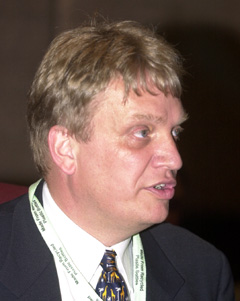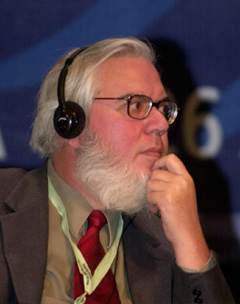|
|
|
Community action, global impact: Launching UNDP partnership initiatives |
|||||||
 |
|||||||
|
From the left: Nalini Burn, Mauritius; Alvaro Umaña, UNDP; Zephrin Diabre, UNDP; Nadine Gordimer, UNDP Goodwill Ambassador. |
|||||||
|
This event explored the role of communities in contributing to sustainable development, and launched a series of new UNDP-led strategic partnerships to implement the WSSD's framework on Water, Energy, Health, Agriculture and Biodiversity (WEHAB). Zephrin Diabre, UNDP, explained that UNDP created "Capacity 21" and other local initiatives to implement capacity building in developing countries, and that it launched the new "Capacity 2015" programme to continue supporting national efforts for sustainable development. He underlined that one of UNDP's key strategies for tackling global sustainable development has been the fostering of cross-cutting partnerships. Diabre noted that UNDP is coordinating global and national efforts to achieve the Millennium Declaration Goals and explained that the new WEHAB partnership initiatives are key to implementing them. Alvaro Umãna, UNDP, highlighted that UNDP has developed an integrated package of partnership initiatives to create enabling conditions and capacities at local and national levels to reduce poverty, protect the environment and achieve sustainable development. He underscored the importance of replicating successful activities established under these initiatives. Nadine Gordimer, UNDP Goodwill Ambassador, said that politics and economics are equally important in achieving development and stressed the need for political empowerment of communities. Panelists from countries taking part in UNDP partnership initiatives presented initiatives and highlighted their contribution to implementing the WEHAB framework. Sunia Delaijagi, Fiji, presented an initiative on a locally managed marine area network. He explained that the initiative promotes community empowerment, restores fish stocks, manages fresh water, and increases access to clean drinking water. Nalini Burn, Mauritius, introduced an initiative that provides electricity and pumping water to poor households in Burkina Faso, Guinea, Mali and Senegal. She noted that access to energy and water allows women and children to engage in decision making, agriculture, education, and crafts, and releases them from heavy and non-remunerated manual labor. Siima Bakengesa, Tanzania, presented a soil conservation initiative which replenishes soils in arid areas by, amongst others, employing bioforestry technologies, and planting native trees. Will Maheia, Belize, presented a project facilitated by the Toledo Institute for Development and Environment. He explained that the project enabled a local community to participate in the management of a marine reserve, resulting in a shift from unsustainable fishing practices to sustainable ones, and in an increase of fish stocks, tourism, and income |
|||||||
|
|
|
|
||||||||||||
|
Beatrice Chaytor, FIELD, explained that in the field of trade, investment, and sustainable development, FIELD submits legal briefs to specific dispute settlement mechanisms, and provides technical assistance to least developed countries in the WTO Committee on Trade and Environment. She highlighted benefits gained from a joint project with UNCTAD on building capacity of developing countries in Asia, Africa, and Latin America, which aims at: improving understanding of trade and environment issues; enhancing policy-making and negotiation skills; and promoting participation, primarily in the WTO. René Vossenaar, UNCTAD, further described the phases of the FIELD-UNCTAD project and noted first successes. He identified possible shortcomings of capacity building, including frequent change of government officials, and lack of dissemination, follow up, and in-depth analysis of issues. Raúl Garrido, Cuba, explained Cuba's participation in the FIELD-UNCTAD project and its benefits, including clarification of concepts and issues, and strengthening of negotiation positions for the 2001 Doha meeting. Carolina Lasén Diaz, FIELD, outlined FIELD's capacity-building work on biodiversity issues, including publications, and highlighted work undertaken on access to genetic resources and benefit sharing (ABS) in the Pacific Islands region. She said that similar projects on ABS and biosafety are underway in other regions. Discussion: Participants discussed various issues, including: Capacity building for politicians and diplomats; demand-driven capacity building; funding for capacity-building activities; and relations between negotiators and those in charge of implementation. |
|
|
|
||||||||||||||||
|
Heidi Hautala, European Parliament, noted the importance of improving fuel quality in developing countries, stressed that partnerships should not replace, but complement WSSD "type 1" outcomes, and suggested addressing corporate responsibility within the Partnership. Roger Beale, Australia, called for pragmatic measures to address air pollution, which incorporate: local industry capacity; vehicle fleet; and behavior. He stated that improving fuel quality constitutes "one of the quicker fixes" in addressing pollution and health problems. Sandrine Dixson-Declève, International Fuel Quality Center, noted the possibility of achieving a total phase-out of lead with appropriate political support, and stressed that sulfur and other harmful substances should also be reduced. Sun Zhen, China, stated that problems of air pollution should be addressed holistically, and advocated city-specific solutions that involve local governments and improve awareness. Maria Rapuano, AECLP, explained that elimination of lead provides a gateway to addressing other harmful pollutants by promoting catalytic converters. Richard Kassel, National Resources Defence Council, emphasized the importance of improving the quality of diesel, which currently causes asthma, cancer and premature death. |
|
|
|
||||||||||||||||
|
M.S. Swaminthan, Centre for Research on Sustainable Agricultural and Rural Development, said that rural poverty alleviation requires a shift towards skilled work. He called for: policies that ensure economic viability of micro-enterprises; corporate responsibility, and media support. Ana Elisa Osorio Granado, Venezuelan Minister of Environment and Natural Resources, highlighted activities of transnational corporations and unsustainable consumption patterns as central causes of environmental degradation and poverty. She called, amongst others, for: recognition of farmers' and indigenous peoples' rights; access to micro-credits; removal of unsustainable agriculture subsidies; and implementation of the Monterrey commitments. Ian Johnson, the World Bank, called for a new agricultural revolution that increases productivity based on the concept of social and environmental responsibility. He recommended local capacity building, support to farmer organizations, knowledge sharing, and prioritization of agriculture and food security in the WSSD's outcomes. Victoria Tauli Corpuz, UN Voluntary Fund for Indigenous Populations, outlined key issues in indigenous peoples' poverty alleviation, including recognition of their rights to land and resources, and preserving traditional livelihoods. She called for WSSD discussions to focus on sustainable agriculture. Werner Kiene, WFP, identified social risk management and safety nets as crucial components in implementing rural development strategies. He stated that safety nets are a tool for enabling the social inclusion of the very poor. Hans Herren, International Centre of Insect Physiology and Ecology, stressed the need for more specific research to address the root causes of rural poverty and recommended that research be an integrated component of development projects. Phrang Roy, IFAD, underscored that sustainable agriculture is central to poverty alleviation and sustainable development. |
|
|
|
||||||||||||||||||||||
|
John Kilani, CDM Executive Board, highlighted that the Board has prepared a list of modalities and procedures for the CDM and given guidance to participants related to projects accreditation. Agus Sari, CAN, said that CDM projects should, inter alia: contribute to sustainable economic, social and environmental development; promote public participation; and reduce greenhouse gas emissions. Charles Nicholson, British Petroleum (BP)-Amoco, presented the BP Rural Solar Project, a CDM partnership with the Brazilian Government, which aims to supply sustainable energy for 2,000 schools. Satish Roopa, South Africa, said that CDM rules and procedures should allow local governments to decide on projects in their communities. Mohammad Salamat, CDM Executive Board, highlighted that the Board has examined tools to guarantee regional balance in the implementation of CDM projects. Sandy Gauntlett, Indigenous Peoples Organizations, said that CDM projects must respect and recognize indigenous people's rights and knowledge, and share benefits with indigenous people. |
|
|
|
||||||||||||||||||||
|
|
|
||||||||||||||||
|
Pía Ximena Rodríguez, International Development Law Institute, stressed the role of lawyers in promoting sustainable development. She expressed regret over the lack of adequate training, knowledge and skills in developing countries, and over insufficient academic interest in sustainable development-related issues. Philippe Roch, Switzerland, shared domestic experience on developing sustainable development laws, which includes greater involvement of the economic sector. Brian Emmett, Canada, explained the shift in perceptions regarding the relationship between environmental and economic issues. He highlighted the need for: an appropriate institutional and legal framework; governance; and capacity building. Ashfaq Khalfan, CISDL, presented the International Jurists Mandate on Sustainable Development opened for signature in June 2002. Discussion: Participants addressed various issues, including: the common but differentiated responsibility and precautionary principles; the role of francophone international lawyers in developing international sustainable development law; the concept of common heritage of humankind; cooperation between all sectors of society; and capacity building. |
|
|
|
||||||||||||
|
Discussion: Participants discussed reasons for certain countries' resistance to incorporate social aspects in the WSSD outcomes, including fear of protectionism, lack of capacity to comply with ILO regulations, and economic advantages of maintaining the current situation. Participants also debated a proposal presented by the Belgian Minister of Economic Affairs regarding a social labeling scheme indicating producer's compliance with ILO standards. Some participants welcomed the proposal, while others highlighted the difficulty to guarantee credibility of labeling, highlighted its business implications, and advocated a cautious approach. A participant criticized the absence of a reference to the ILO and to the needs and role of agricultural workers in the WEHAB paper on agriculture. ILO representatives also answered questions regarding child labor and the ILO's work on youth employment. |
|
|

